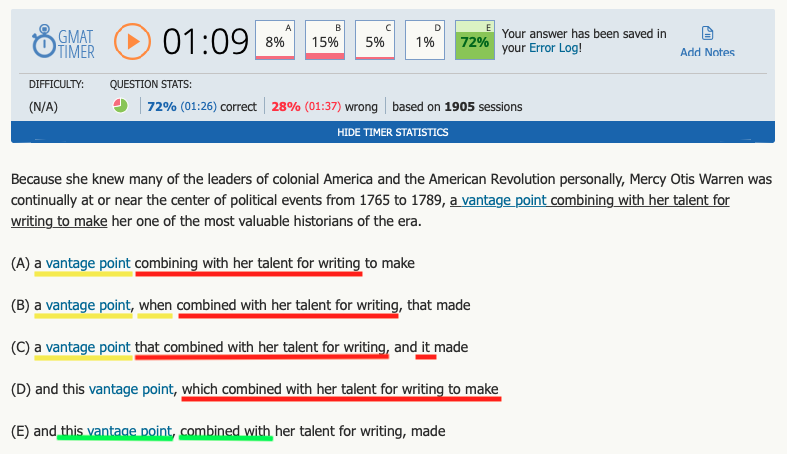mSKR wrote:
Hi
AndrewN sir
A general question
When I saw this question, I solved it quickly and end up in choosing A. ( sentence xyz period, <absolute phrase>)
The structure looks good for A and B .
When I got wrong , I read the meaning and was clear with E immediately.
1. Usually I understand the general meaning --> shortlist --> pick with best meaning and standard .
This is one of the question I missed picking right option. Because of somewhat distorted structure, i overlooked the meaning. In this approach , usually I don't take more than a minute( at max) to solve SC questions.
2. If I change my approach , first meaning then structure . I end up in choosing 3 + options sometimes and that takes time , sometimes 100 seconds . So I changed approach to earlier approach(1)
Could you please share your opinion?
It's more like meaning vs speed. Were you used to get slowed down with meaning approach before ? How can I speed up?
Looking forward to hear comments . how did you crack this question and in how much time ? My bet under 20 seconds?

Thanks
AndrewN sir

Hello,
mSKR. I think you may be chasing speed too much. Accuracy first. If the approach takes you 100 seconds at first, then so be it. My take on the question, via my newer color-coded image method:
Attachment:
 Screen Shot 2021-05-24 at 06.10.48.png [ 98.04 KiB | Viewed 6325 times ]
Screen Shot 2021-05-24 at 06.10.48.png [ 98.04 KiB | Viewed 6325 times ]
First off, you can see that I spent over a minute on the question myself. Sometimes a longer sentence takes more time to sort out, and you do not want to get trigger-happy.
(A), (B), and (C) all start on questionable ground with the label
a vantage point. What, exactly, is that
vantage point?
At or near the center of political events? I am not sure that works. When I read
a vantage point on its own, I am anticipating a physical location, and this one seems more metaphorical (like being the
center of attention). Still, my general rule is that if I am not
certain something is wrong, I label it a doubt and seek easier points for elimination.
The
combining phrase in (A) makes it sound as if the
vantage point is
joining with one of her talents, and this is too much for the sentence to bear.
Combine with in its various forms should be more akin to
in addition to or
as well as in the context of the sentence. Simply put,
a vantage point in addition to her talent for writing to make her [something] makes no sense.
I see that (B) is the most popular incorrect answer as of this writing. A lot of people seem to overlook
when, though. Even if you do not pick up on the subtle change in meaning that it creates, a meaning that is discussed earlier in the thread, you should look at it and ask,
Is when absolutely necessary? Remove it, and the phrase conveys the same vital meaning:
a vantage point, combined with her talent for writing, that made... If
when is not necessary, then why would we select this answer choice, not to mention that the
combined with element is still a problem. How about we swap it out for
as well as this time?
A vantage point, when as well as her talent for writing, that made... Yes, this one is definitely out.
(C) misses the mark for the same
combined with misuse, and now we get this mysterious
it as the subject of the second independent clause. Is
it the
vantage point? But I thought it was the combination of
vantage point and writing talent that made her a valuable historian. After (A) and (B), this should be an easy elimination.
The
which clause in (D) subordinates all the information that follows, and without the addition of another comma, the second clause that begins
and this vantage point never resolves. SC 101 on full display right here.
In (E),
combined with finally makes sense:
this vantage point, in addition to her talent for writing, made her [something]. The process of elimination can help you reach this answer, but so, too, can a meaning-based approach.
In short, do not rush SC. When I started, I would often answer questions in under 45 seconds, and sometimes, the subtler questions would get me into trouble, and getting annoyed with myself enough times, I slowed my approach. My accuracy increased to new heights thereafter.
I hope that helps. Thank you for thinking to ask me.
- Andrew



 25%
(medium)
25%
(medium)
 28%
(01:39)
wrong
28%
(01:39)
wrong  based on 2995
sessions
based on 2995
sessions



